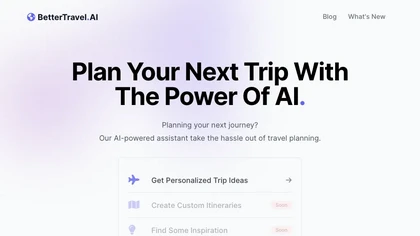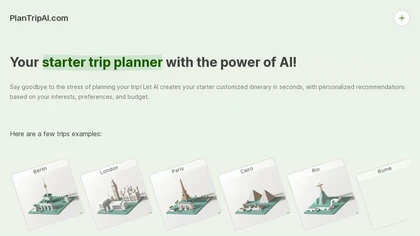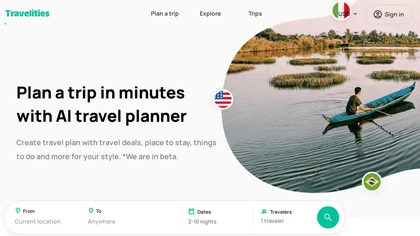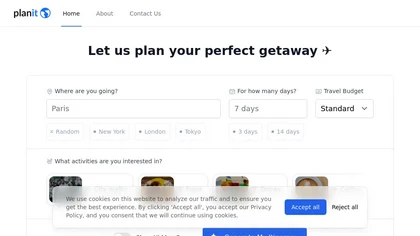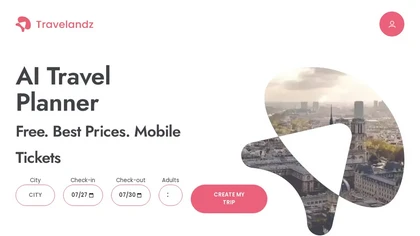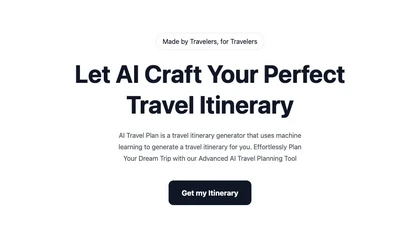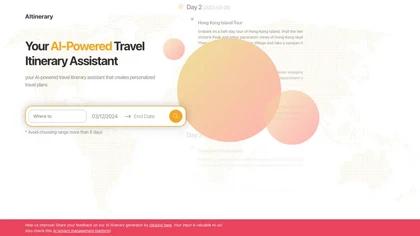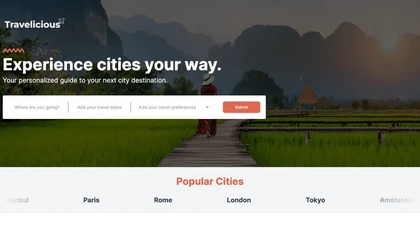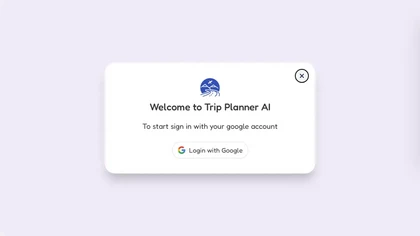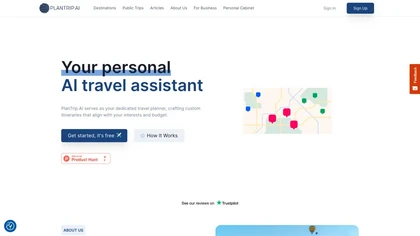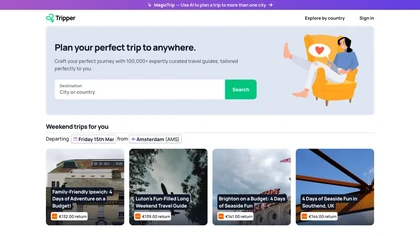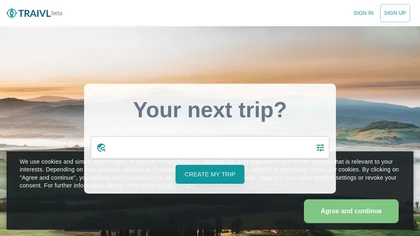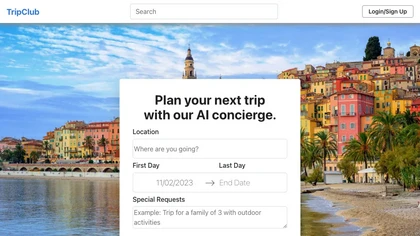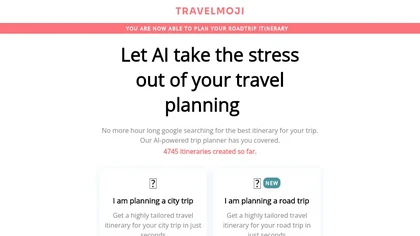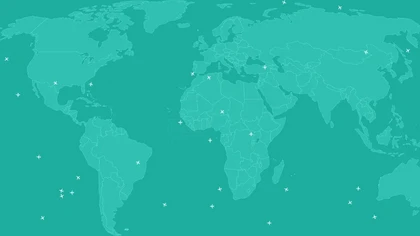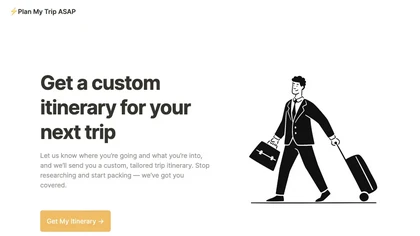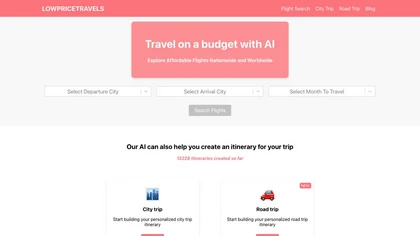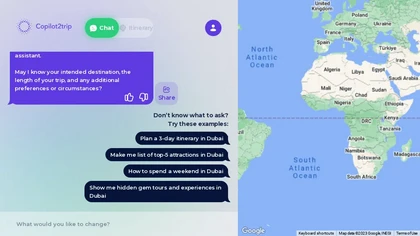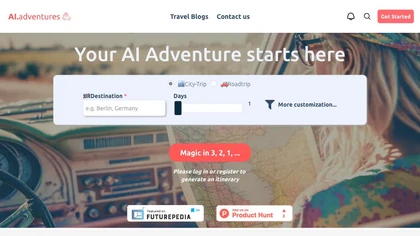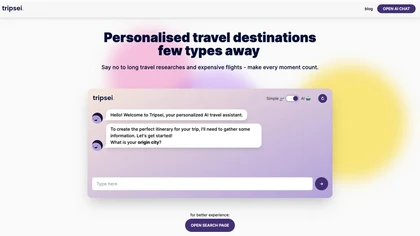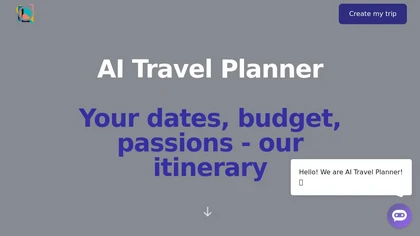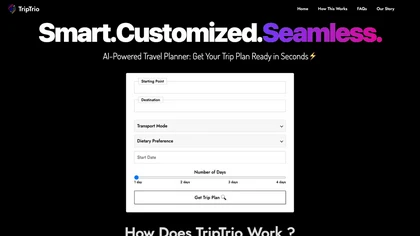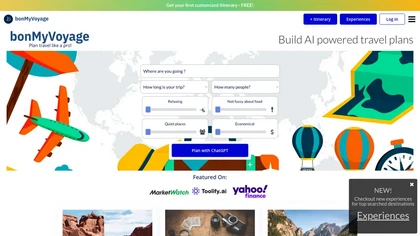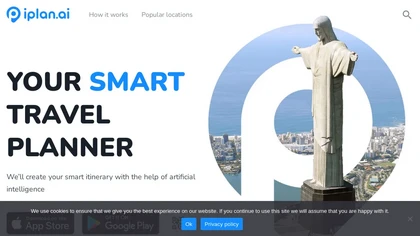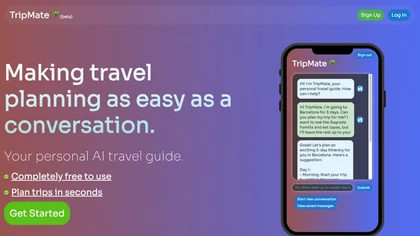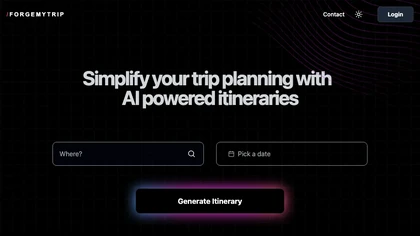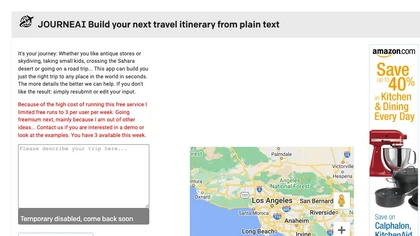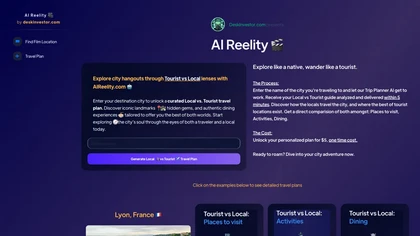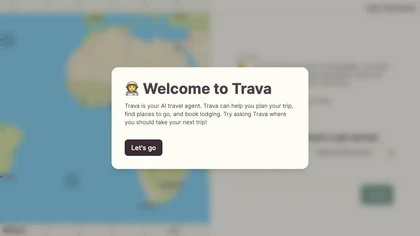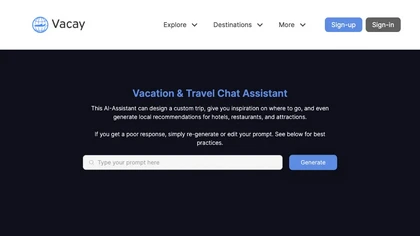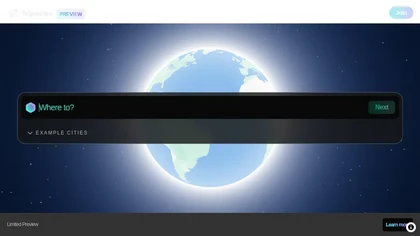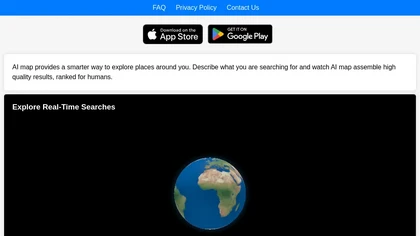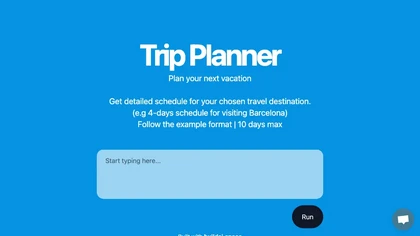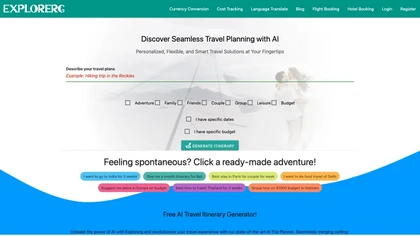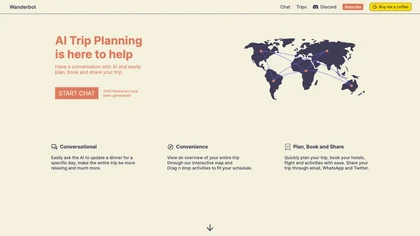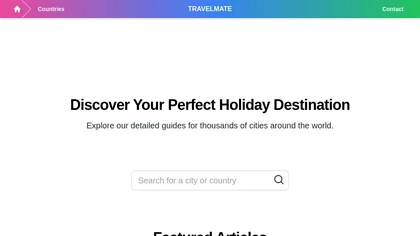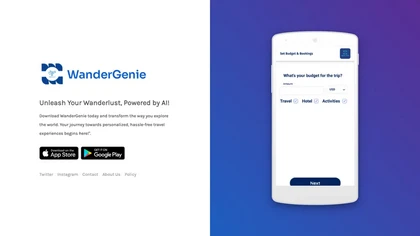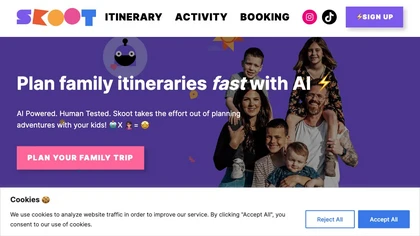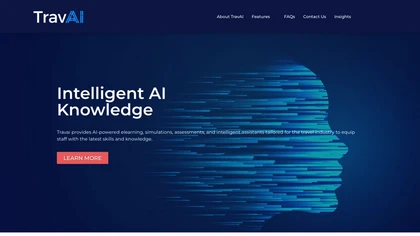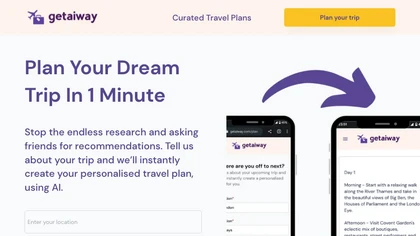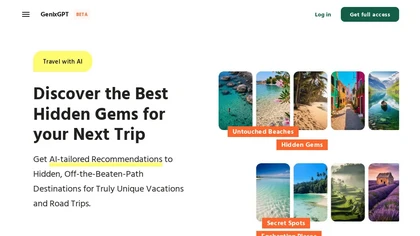AI use cases for Travel
Generative AI can be applied in various applications for travel. Here are some examples to explore below for inspiration with AI tools to get you started with using AI in travel.
🛠️ 70 AI tools for Travel
Explore a dynamic list of some of the most popular tools to get you started with various AI use cases and applications for Travel to streamline your workflows and productivity today.
Bettertravel features
- Generate personalized travel recommendations
- Customize itineraries based on user preferences and interests
- Assist with travel planning without extensive research
- Easily input budget and travel plans
- Provide tailored recommendations for a more enjoyable trip
FreePlanTour features
- Travel itinerary generation
- Personalized travel guides
- Multi-language support
- User-friendly interface
- Subscription plans
Guidie AI features
- personalized recommendations
- plan and optimize itinerary
- real-time updates
- mobile app
- location discovery
PlanTripAI features
- Trip planning
- Customized itinerary
- Personalized travel
- Generate based on interests
- Budget
Travelities features
- Trip planning
- Personalized recommendations
- Travel deals
- Place recommendations
- Things to do
Planit Earth features
- Generate personalized itineraries
- Cater to traveler's interests and budget
- Provide detailed itineraries
- Easily accessible through a link or pdf
Wonderplan features
- Personalized itinerary generation
- Customizable itinerary planning
- Real-time collaboration
- Trip feedback improvement
- Connecting with like-minded travelers
🔥
Create your account, save tools & get personal recommendations
Receive a weekly digest of our handpicked top tools.
Unsubscribe anytime
TraveLandz features
- Personalized travel plans
- Real-time availability of hotels, attractions, and transportation
- Simplify the planning process for travelers
- Provide the best prices for hotels and activities through partnerships with travel agencies
- User-friendly interface allows for easy navigation and exploration of unique destinations
Travelplan features
- Destination selection
- Itinerary generation
- Travel preferences customization
- Language preference selection
- Friends sharing
AItinerary features
- AI-powered
- Creates personalized travel plans
- Meticulously plans each day
- Suggests activities and must-visit spots
- Provides suggestions for various experiences
The Trip Boutique features
- Create itineraries
- Recommend destinations
- Leverage expert knowledge
- Curate database of places, activities and services
- Offer various integration options
Travelicious features
- Personalization of city destination experience
- Integration of AI for itinerary creation
- Recommendations based on user preferences
- Input destination, dates, budget, and interests for tailored journey
- City guide with recommendations on places to visit, eat, and explore
My Travel Brain
1.6My Travel Brain features
- Plan travel
- Knowledge of travel destinations
- Answer questions about travel destinations
Travopo features
- Travel planning
- Inspiration
- Flight search
- Hotel search
Tripplanner.ai features
- Suggest potential destinations
- Receive personalized itineraries
- Suggest nearby restaurants and attractions
- Plan a trip without having to research destinations and activities for hours
Summer AI features
- Ai gps technology
- Personalized experience
- Walking and driving navigation
- Augmented reality discoveries
- Visually enhanced journey
PlanTrip features
- Custom itinerary planning
- Tailored recommendations
- Destination insights
- AI-generated itineraries
- Seamless journey planning
Tripper Guide features
- Personalized travel guide generation
- Customization of trip details
- Access to over 100,000 expertly curated travel guides
- Budget-friendly options
- Exploration of off-the-beaten-path adventures
Traivl features
- Create personalized itinerary
- Plan a trip to any destination
- Get personalized itinerary in less than 5 minutes
- Completely free
- Sample trips
TripClub features
- Interactive calendar
- Tailored trip planning
- Personalized vacation
YaatriAI by AasPass features
- Personalized travel itinerary
- Accommodation recommendations
- Activity suggestions
- Transportation options
Travelnaut features
- Destination planning
- Trip itineraries
- Sightseeing guides
- Nightlife guides
- Insider tips
Local Buddy features
- AI-powered travel planner
- Provides personalized recommendations
- Offers unique places to eat, landmarks to explore, and immersive activities
- Integrates with Google Maps for step-by-step directions
- Available on Android and iOS
Travelmoji features
- Generate personalized itineraries
- Recommend sights, activities, and accommodations
- Easy travel planning
Travel Echo features
- Language translation
- Phrase learning
- Destination selection
- Primary language setting
- Cultural insight
Vooyai features
- AI-powered trip planning tool
- Creates itineraries for exploring different places
- Supports video tags
- Enhanced recommendation model for accurate suggestions
- Allows booking of accommodations, transportation, and activities
Plan My Trip ASAP features
- Custom itinerary planning
- Pre-made itinerary selection
- Top dining recommendations
- Top bar recommendations
- Top cafe recommendations
Itair features
- Personalized itinerary generation
- Customized recommendations
- Instant itinerary creation
- Support for various interests and preferences
- Solo and group travel planning support
Roam Around features
- Travel planning
- Customized travel plans
- Pet-friendly itineraries
- Budget-friendly trips
- Honeymoon itineraries
- Family-friendly itineraries
LowPriceTravels features
- Flight search
- Itinerary creation
- Personalized trip suggestions
- User-friendly platform
- Customized itinerary creation
Nomadspot features
- Trip organization
- Create travel itinerary
- Personal map sharing
- Community sharing
- Ai-powered planner
Copilot2trip.com features
- Plan trips
- Create itinerary
- Find attractions
- Navigate city
- Use map data
AI adventures
1.8AI adventures features
- Generate personalized travel plans
- Offer options for city trips, road trips, and custom itineraries
- Use openai's gpt4 model
- Interactive travel blogs
BabelOn features
- Trip organization
- Destination exploration
- Detailed trip planning
- Budget management
- Smart suggestions
tripsei features
- Personalized travel options
- Cheapest flight ticket search
- Data-enriched travel suggestions
- Streamlining flight research process
- User-friendly AI chat interface
planmytripnow.ai features
- Create custom travel itineraries
- Offer low-cost, mid-level, and luxury travel options
- Recommend flight and accommodation deals
- Find best local activities and restaurants
TripTrio features
- AI-powered travel planner
- Generates customized trip itineraries
- Personalizes itinerary based on user inputs
- Suggests recommended places to visit, activities, dining options
- Allows fine-tuning of itinerary and offline access
bonMyVoyage features
- AI-powered itinerary travel planner marketplace
- Customized travel plans creation
- Curated recommendations from verified users
- Tailored travel plans based on preferences
- Connect with verified locals for insider tips
iPlan.ai features
- Create personalized itineraries
- Save time
- Access itineraries anywhere
- Make changes as needed
- Receive updates via email
TripMate features
- Personal AI travel guide
- Conversational interface
- Generate itineraries and trip plans
- Provide hotel and restaurant recommendations worldwide
- Tailored recommendations based on travel style
ForgetMyTrip features
- date picker
- itinerary generation
- AI-powered travel planning
Five Phrases features
- Language learning support
- Essential phrase teaching
- Audio output feature
- Native text options
- Localization support
JourneyPlan features
- Destination selection
- Travel duration planning
- Budget planning
- Accommodation preference setting
- Activity and restaurant recommendation
Nowy features
- Tailored visual itineraries
- Custom routes and maps
- Seamless booking
- Personalized recommendations
- Discover nearby gems
Journeai features
- Build travel itineraries
- Recommend activities
- Assist with trip planning
- Help with destination selection
- Customize travel experiences
Wanderias features
- AI-based personalized trip planning
- Utilizes advanced algorithms to analyze preferences
- Delivers tailored travel recommendations
- Efficiently completes vacation planning process in minutes
- User-friendly interface for creating and sharing personalized travel plans
AIreelity features
- Destination city input
- Curated travel plan generation
- Comparison of local and tourist attractions
- Personalized travel plan creation
- Quick access within 5 minutes
Trava features
- Trip planning
- Hotel search
- Restaurant booking
- Travel destination recommendations
- Itinerary saving
Vacation & Travel Chat (GPT) features
- Provide custom trip plans
- Suggest destinations
- Recommend hotels
- Recommend restaurants
- Assist with trip planning
TravelAroundTheWorld features
- Create photorealistic ai character
- Take photos at famous spots around the world
- Variety of photo shoot styles
- Advanced ai technology and deep learning algorithms
- User-friendly interface
Tripnotes.ai features
- Generate a travel plan
- Assist in trip planning
- Provide recommendations based on inputs
- Consider various factors in generating plan
Orbt features
- Personalized travel itineraries
- AI technology integration
- Customized itinerary generation
- Newsletter subscription for travel trends
- Feature on ProductHunt
SpeakSpots features
- Personalized itinerary generation
- Integration with WhatsApp
- Selection of travel preferences
- Utilizes over 40 intelligent algorithms
- Convenient access to itinerary
Travellergram features
- Flight and hotel search functionality
- Support for multiple currencies
- Smart pricing algorithm for hotel rate comparison
- Payment security features (SSL encryption, fraud protection)
- 24/7 customer service support
AI Trip Planner features
- Get travel destination recommendations
- Generate a travel itinerary
- Assist in finding accommodation
- Provide transportation options
- Help plan budget and expenses
Triplay features
- Crafting personalized travel itineraries
- Automatically reorganizing points of interest based on geodata
- Effortlessly rearranging destinations in itinerary using drag & drop functionality
- Providing expert travel tips for various destinations
- Offering recommendations for best-kept secret restaurants
Explorerg - Discover features
- Personalized itineraries
- Custom-made recommendations
- Currency conversion
- Language translation
- Cost tracking
Wanderbot features
- Conversational AI trip planning
- Generation of up to 1000 itineraries
- Updating specific plans
- Interactive map for schedule overview
- Sharing trip via email, WhatsApp, Twitter
Wunderguide features
- Discover top attractions
- Create curated list of must-visit spots
- Generate personal audio tour
- Ask for historical insights and local tips through speech-to-text function
- Enhance travel experience with AI-powered features
Travel Mate features
- Select a country
- Discover perfect holiday destinations
- View ai-generated guides
- Thousands of cities worldwide
WanderGenie features
- Personalized recommendations
- Hassle-free planning
- Exclusive launch-day deals
- Tailored dream trips
Her Trip Planner features
- Personalized itinerary generation
- Curated safety data reports
- Convenient booking of flight, hotel, and experiences
Skoot features
- Customized itinerary planning
- Activity suggestions
- Restaurant recommendations
- Deal finding
- Budget considerations
AMBLR - AI Travel Planner features
- Travel planning
- Curated approach
- Personalized guidance
- Activities recommendation
- Trip editing
Mighty Travels features
- Sign-up
- Fares dashboard
- Real-time email alerts
- Airfare offers
- Error fares
- Hotel mistake rates
- Personal ai-powered travel assistant
- Thousands of detailed travel itineraries
- Destination guides
TravAI features
- AI-powered eLearning
- Simulations
- Assessments
- Intelligent assistants tailored for travel industry
- Utilizes artificial intelligence for training course creation
Getaiway features
- Create personalized travel plan
- Eliminate need for endless research
- Ask friends for recommendations
- Provide a personalized itinerary within an hour
- Fit any budget, vibe, or taste
MonteTravelo features
- Discover unique travel destinations
- Provide unusual accommodations
- Offer access to unique spas
- Guide thrill-seekers to adrenaline attractions
- Filter choices by continent
GenixGPT - Travel AI features
- Personalized vacation suggestions
- Tailored travel planning
- Off-the-beaten-path destinations
- Remote and rugged landscapes
- Untouched beauty
